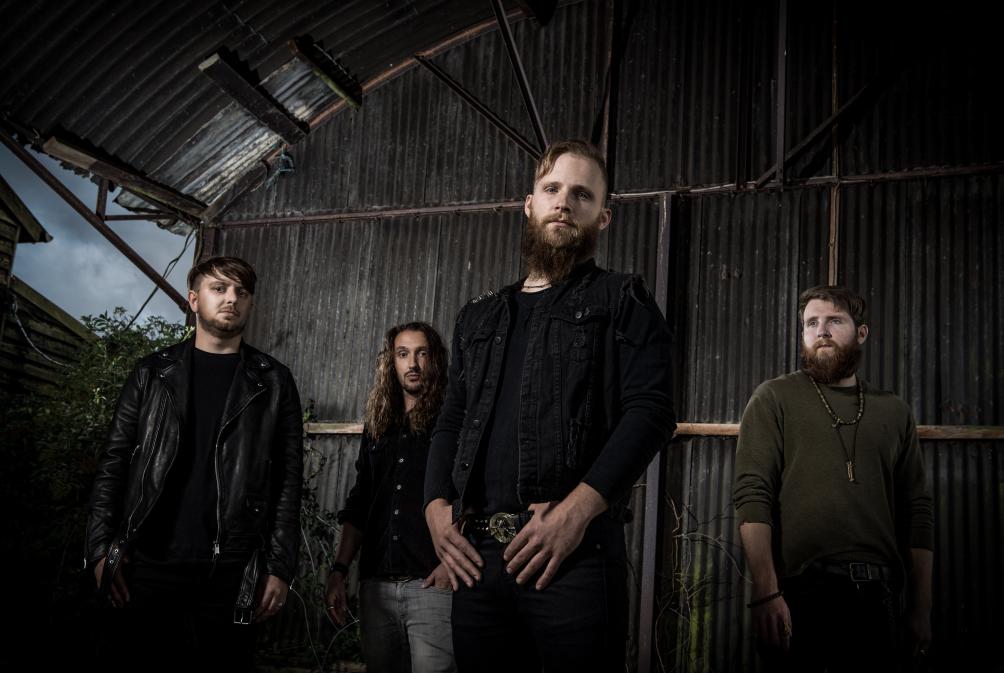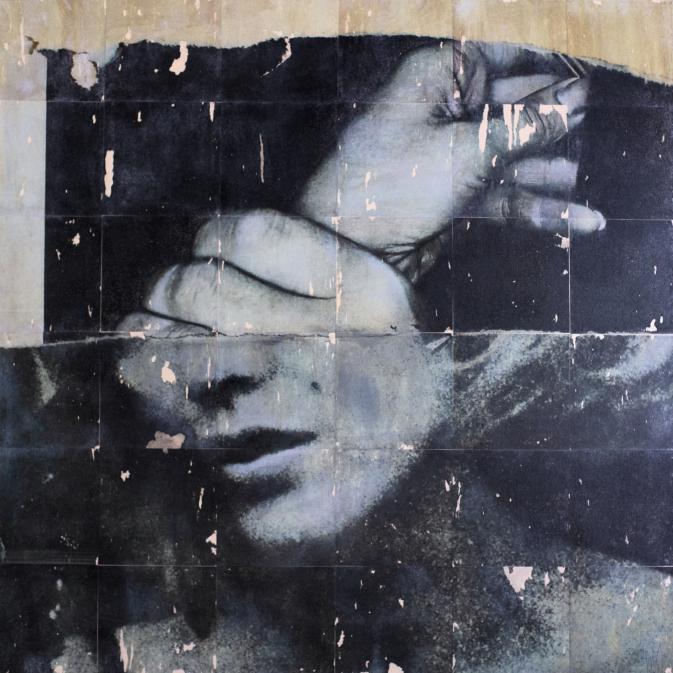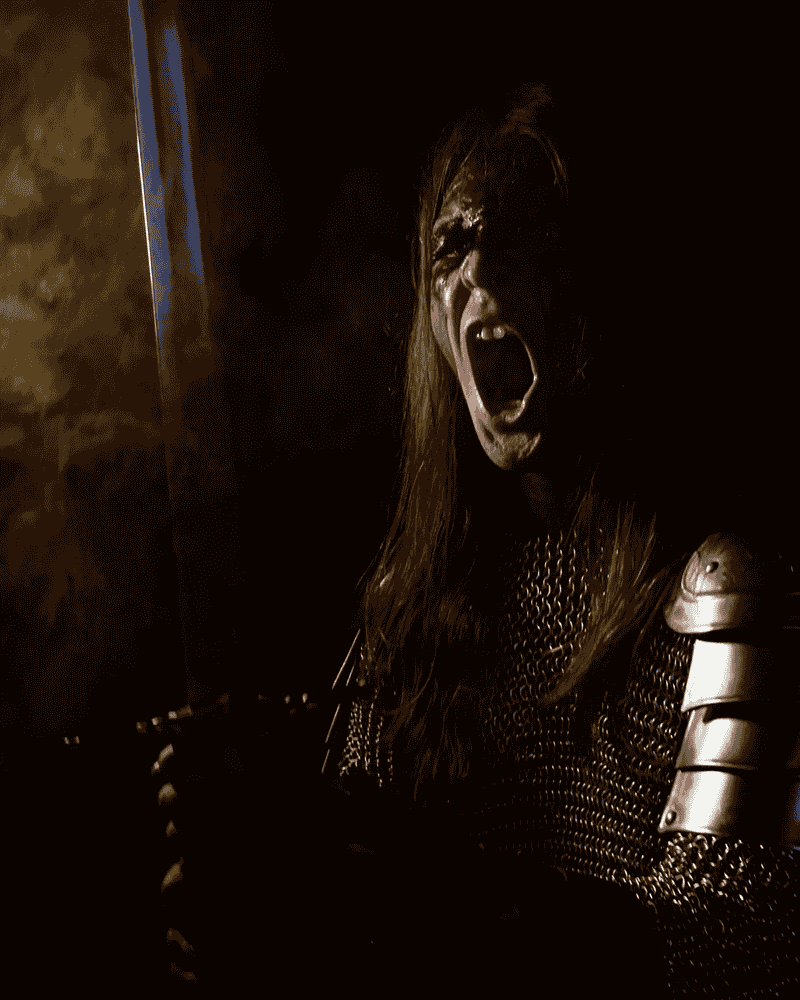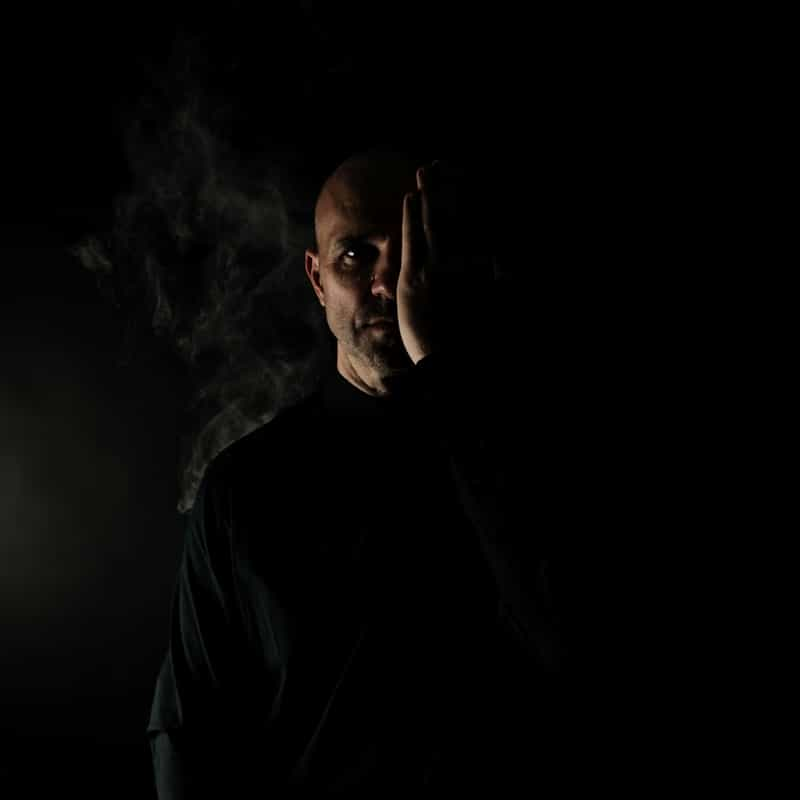Telepathy Interview

Sludge-influenced instrumental post-metal is not a common description of most bands or musicians. For Telepathy, however, it should be something of a badge of honor, as it highlights their originality.
Following the critical acclaim of their second album, “Tempest”, which drew from external forces, like climate change, they redirected their gaze inward when composing their third LP, “Burn Embrace”, which will be released March 27 via Svart Records. Despite the fact that there are almost no lyrics one senses a collective inner turmoil from Telepathy’s four members on Burn Embrace that range from a simmer to a potentially dangerous boil and back again through seven tracks and 44 minutes.
This is clearly not party music and, depending on your state of mind, “Burn Embrace” could take you on an involuntary tour of your subconsciousness. Its opening tracks, “Eternal Silence” and “Pariah” begin the desolate journey with slow-paced and angst-ridden harmonies that are laced with tempo changes, echoing leads and powerful double-kick drumming.
But there is a glimmer of hope that shines ever so slightly as the album progresses, which is the beauty of this down tuned and pristine sounding work. By the time you reach the penultimate track, “Sorrow Surrenders Its Crown” and the title track you realize you may be richer for the experience and somewhat empowered by purging the sense of loss and desolation.
Blessed Altar Zine had a chance to catch up with Telepathy guitarists Piotr Turek and Richard Powley to discuss their composition processes, why they actually wish they had a bit more competition and how they emote through a very niche instrumental subgenre.
Justin Smulison: What inspired you to play this unique brand of instrumental metal music?
Piotr Turek: I think writing instrumental music came quite naturally. I was always attracted to big, epic tunes and found that instrumental music is a good medium to really include a story within the music. It leaves a lot of freedom for interpretation, and that’s one of the factors that always drew me toward instrumental music. Some of the major songs and artists that inspired me at an early age would be “The Call of Ktulu” by Metallica, and the album The Campfire Headphase by Boards of Canada.
When writing, do you hum a lead or melody and then play it out on a guitar?
PT: Our writing process starts from either a riff or basic melody. It can take hours or weeks to write a song – some of our tunes take as long as a year to finalize. The writing process for every album is always slightly different, but the majority of our music is written when we’re all together in our jam space. We bring our favorite ideas and work on them together. On a good day, it feels like songs are writing themselves. One of the good examples of that is the song, “The Void in Aimless Flight.” Don’t get me wrong—it was a long day and a lot of work—but the song was written within a day, based on a melody written a few months back.
I guess it’s about being creative and reactive, hearing certain sounds and inspiring new ideas. Sometimes you hear the melody in your head or just feel it, which when it happens, is one of the best feelings ever.
Though there are no lyrics, you certainly emote through your playing (hence your band name). How do you accomplish this? And is it a conscious strategy influenced by the way you tune the instruments?
PT: There is never a solid plan for how we will do things, and only recently we started working on lyrics, which is another path that this band is happy to take. We always do what feels right in the moment.
The way we tune our guitars has a definite influence on our music. It was actually one of the main factors that created our sound. It happened before the band was formed, sort of by accident. I remember sitting down one evening to work on some riffs and decided to take a break and play some cover songs. I tuned a couple of strings down to be able to play one of my favorite Tool songs, “Parabola,” and left it like that overnight. I picked it up the next day and played what became the first Telepathy riff.
I think big songs with lots of progression and changes will always be the major part of this band, but we’re definitely looking forward to expanding our sound much further.
Once you commit to instrumental music, how much more or less challenging is it to compose?
PT: It’s exciting. The challenge is to always do it better, but we love it so much that we just get excited about the idea of writing new songs.
Instrumental music really does give you a lot of freedom, we want the songs to stand on their own but also to paint a larger picture in the context of the album and for the listener to be able to get lost within them. Personally, I don’t know why there are not that many instrumental bands doing what we do, as it’s such an exciting way to write music.
Speaking of getting lost in the music, my experience listening to the album has been alone, in a distraction-free space. It sparked a lot of creativity and progress. What are some reactions you are getting from people?
PT: We were always lucky with getting our message across, it always seemed like people felt and imagined similar ideas to those we had when writing the songs. That is always such an amazing reward. [I have found] that our fans and friends expect to hear a story throughout the album, some sort of concept. Hopefully, this is what we’re succeeding at by creating a solid theme with Burn Embrace, I feel that we managed to make each song tell their part of the story in a much stronger way than ever before.
“Black Earth” is a standout track. It creates a cinematic atmosphere and I imagine it being played in a documentary or even in an Imax. How much did environmental issues like climate change influence its composition or mood?
PT: I think the environment has a lot to do with it, but more from personal, everyday experience, rather the global issue. Our previous album, Tempest is very much based around natural disasters, so it’s not foreign to us to use climate as an influence.
At the time of writing “Black Earth” we were staying at a really cold studio sometime around February 2019 and it was deep in the countryside with no heating with some really nice views. I remember us trying to stay warm, drinking lots of coffee and shredding the beginning riff of “Black Earth”.
We love film soundtracks and the idea of our music ending up someday as one would be ace, so I’m happy that you can see our music fitting that.

The double-kick sections of “Black Earth” are echoed later by very fast guitar strumming. How intentional was that sort of symmetry?
Richard Powley: Symmetry in arrangements is something we have always toyed with and in a way it has become a recurring theme. We love to start tracks with one chord sequence or idea and have it mutate throughout the arrangement, or come back full circle in an unexpected manner. For this record, since we were thinking along with the concepts cycles of life and death, loss and rebirth—it seemed paramount to include this writing approach to the album.
Since you are tuning further down, what steps did you take to ensure that the bass was heard in songs like “The Void In Aimless Flight”?
RP: The sonics of the record was down to our producer Jaime Gomez Arellano [Ghost, Myrkur, Paradise Lost] whom we also worked with on Tempest. The record was tracked with a custom bass, active pickups, and a vintage Ampeg SVT, the rest is in the mix and composition. Our bassist, Ted Driscoll is fantastic at both weaving in and out of arrangements while still supplying the thunder when necessary.
The album title seems to suggest letting go of something that was once special or significant. Would you say this is accurate and how is the music telling that story?
RP: This is entirely accurate! The album’s central themes are loss, grief, struggle and eventual rebirth. Sometimes in life, you have to let go of those things you love and you will, at some point, face adversity. These themes were with us in our daily lives during the making of the album so it’s natural they crept into the album.
Hopefully, the powerful yet melancholic nature of the tracks brings this across, along with the arrangements which we aimed to represent the cyclical nature of life and death, struggle and rebirth.
There’s a slightly muted primal scream during “Sorrow Surrenders.” How did you know that was a point to add some vocals? And what is being said?
RP: As cliche as it sounds, it just felt right at the time. We wanted to encapsulate all we’d been through during the making of the album, and the only way that felt right was with voice and words.
Embers we hold
Burn us no more
Waged with death
Everlasting strife
Forever left our home
To a grave of sons
What are some influences—musical or otherwise—that might surprise your fans?
PT: We all like different music, we have some common likes, and one of them would be love for big songs and a cinematic sound. We’re definitely all fond of Metallica, and way too many artists to name from 1960s and 70s rock, electronica to classical music. Some of the non-metal artists that influenced us throughout the years of being in this band would be Fever Ray, Vangelis, The Cure, Bohren & der Club of Gore and Fleetwood Mac.
What have been your best experiences so far as a unit?
RP: So many, but completing this record was up there. Other highlights have included playing Roadburn Festival, headlining the Forest stage at Dunk! Festival, Arctangent Festival and touring with our friends in Solstafir and Bongripper.
What do you hope to accomplish as a band?
RP: We just hope to continue being able to write, record and tour music that feels compelling to ourselves and our audience. With every new record and tour, things feel like they are growing for us in an artistic sense and in terms of our audience too, which is amazing.
At this point, it seems like our lives’ work to put everything positive and negative into this creative outlet, and having people along for this ride is hopefully impacting them in a positive way too.
Interview by Justin Smulison
Band
Bandcamp
Website
Youtube
Facebook
Spotify
Instagram
Twitter
**Please support the underground! It’s vital to the future of our genre.**
#WeAreBlessedAltarZine
#TheZineSupportingTheUnderground


